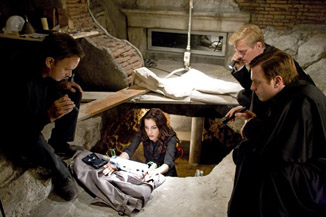Book vs. Movie: Angels & Demons
By Russ Bickerstaff
May 18, 2009
For all of its many limitations, Angels & Demons is actually a well-paced murder/suspense story. The murder that Harvard Symbologist Robert Langdon is asked to investigate in the CERN compound in Europe turns out to have connections to a series of murders and the possible terrorist use of antimatter in Vatican City. The pacing of the novel quite competently moves Langdon from Harvard to CERN to Italy without slowing the rush of events at all. This is important as the novel's pacing and its status as a best seller are really its only good qualities. Nearly everything else is flawed in some way.
But perhaps I'm being disingenuous. It takes considerably more than good pacing to make a best seller. With Stephen King, there's a love of storytelling that speaks through the narrative. With Tom Clancy, there's an alarming level of technical knowledge that permeates the text. With John Grisham, there's an understanding of legal issues that animates everything. With Brown... there's an understanding of the public's fascination with basic subjects. With Angels & Demons, Brown has framed a story featuring a conflict between science and religion that everyone seems to be interested in. In a way, it doesn't really matter that very few of Brown's details about science and religion are factual. What he's done here is successfully frame a story around the conflict that has enough details to seem real to people who wouldn't otherwise be interested in reading nonfiction texts on the subjects. What's savvy about Brown's approach to this is there really are a lot of people with a passing interest in the conflict between science and religion who haven't read the one or two books on the subject that would've made Angels & Demons silly at best and at worst, boring. That's okay; Brown's not terribly interested in this stuff either. Judging from the superficial level of the factual details and the gross amount of errors present in all of the deeper stuff, the total amount of research he did in the background of the novel probably could've taken little more than a couple of afternoons on the Internet. Brown has succeeded in writing a wildly popular novel that is every bit as generally disinterested in the deeper aspects of its subject matter as the people who have made it successful.
The Movie
As the film begins, we see a contrast between the Vatican dealing with the death of a pope and scientists at CERN producing a large amount of anti-matter. It's a nice start that has a dramatic impact lacked in a lot of Brown's early mucking about in the beginning of the novel. Rather than having Langdon contacted by CERN at all, he's contacted by the Vatican, throwing him right into the heart of the conspiracy, which is an excellent idea on the part of screenwriters David Koepp and Akiva Goldsman. Much of what Brown did at CERN was exhibit a gross misunderstanding of the culture of research scientists, turning the whole atmosphere into the guarded secrecy of a pulp sci-fi mad scientist rather than the more open atmosphere of a respected research facility.
Continued:
1
2
3
|
|
|
|




